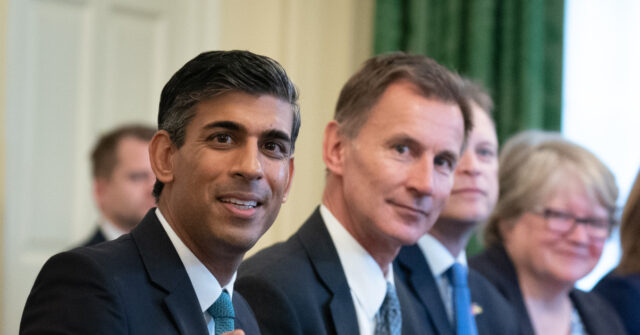

Britain’s finance minister said that Britons must “face into the storm” as he announced a swath of new taxes and spending cuts, supposedly to shore up the nation’s finances while somehow still stimulating growth, as the country faces the prospect of the longest recession in recorded history.
Jeremy Hunt, the self-styled “Scrooge” Chancellor of the Exchequer, addressed the House of Commons on Thursday morning to announce the plans for his autumn budget, in which he put forward the largest package of tax hikes and spending cuts in over a decade to fill the so-called “black hole” of £55 billion in public finances created in large part during the series of government coronavirus lockdowns, which he personally championed — indeed, he lobbied for harsher measures along the lines of Communist China.
Hunt, an anti-Brexit, pro-China relic of the David Cameron era, who played a key role in the globalist coup that took out former prime minister Liz Truss for her failed plan to cut taxes, announced that he would be implementing £30 billion in spending cuts and £24 billion in tax rises over the next five years.
This is on top of the £32 billion in taxes he raised last month, meaning that the British public now faces the highest tax burden since the Second World War.
The tax hikes will see the threshold for the 45 per cent top tax rate lowered from £150,000 to £125,000, meaning that as many as an additional 250,000 people could be forced into paying the top rate for the first time.
Hunt also announced that local councils will be empowered to raise taxes by 3 per cent, adding to the average bill and taking local taxes to well over £2,000 per year.
Watch Live as Chancellor @Jeremy_Hunt delivers the Autumn Statement to the @HouseofCommons. https://t.co/MfMWQ7hz6E
— HM Treasury (@hmtreasury) November 17, 2022
Middle-class families also now face paying thousands more in so-called “stealth” raids on income and inheritance tax, national insurance contributions, pensions, and Value Added Tax (VAT) by the year 2028.
The income tax personal allowance threshold has also been frozen until 2028 rather than 2026, meaning that millions more face their taxes going up, as freezing the threshold keeps the tax bands the same while wages rise and the proportion of income taken in taxes goes up through a process called fiscal drag.
Justifying the measures, Hunt said that “inflation eats away at the pound in people’s pockets even more insidiously than taxes.”
The tax hikes represent just another in a long line of broken promises from the governing Conservative Party, this time breaching the pledges made to keep taxes low in the 2019 election manifesto upon which the current government was elected.
While the Tories try to brand themselves as the party of small government and lower taxes, during the decade-plus they have been in power taxes have been raised on over 1,000 occasions.
Laughable nonsense from @Jeremy_Hunt about recession made in Russia
Self inflicted, tax raising, net zero obsessed recession made by Tories in UK
Its time for a general election
— Richard Tice (@TiceRichard) November 17, 2022
Despite the growing energy crisis across Europe and the UK, the finance minister went on to confirm that the promised freeze on energy bills of £2,500 over the next two years will be scrapped, with the energy price cap to be raised to £3,000 starting in April. The government subsidy payment of £400 this winter to help citizens with soaring energy costs will also not be repeated, meaning that millions face the prospect of ending up £900 down.
The government has also decided to raise the windfall tax on “excessive” profits from energy firms from 25 per cent to 35 per cent, so that the government can continue to invest in the green agenda that has so far failed to achieve energy independence or lower energy bills.
Hunt said that the United Kingdom remains committed to the goals laid out last year at the UN COP26 climate summit in Glasgow, including reducing emissions by 68 per cent by the year 2030.
“With the existential vulnerability we face, now would be the wrong time to step back from our international climate responsibilities,” he said.
Hunt took the typical line from Western leaders, branding the current state of affairs a “made in Russia energy crisis,” despite the fact that the United Kingdom only receives around four per cent of its gas from Russia and therefore could have been immune from much of the impact of the European energy crisis had successive Conservative governments pursued energy independence strategies rather than embarking on green policies and banning fracking.
Parliament has previously been told that government lockdowns, during which Sunak, then Chancellor himself, handed out billions to keep businesses shut and workers at home, were the primary cause of the inflationary crisis. not Russia.
Hunt claimed that while the furlough scheme and the vaccine programme “did our country proud” they “all have to be paid for”.
Cost of Living Crisis Caused by Coronavirus Lockdowns, Not Ukraine, UK Parliament Told https://t.co/J1b2dXrRzz
— Breitbart London (@BreitbartLondon) June 11, 2022
The majority of Hunt’s spending cuts, which could see projects such as building new prisons scrapped, have conveniently been put off until after the next election, in hopes that the economic tides turn and they become unnecessary.
However, given the spectacular personal wealth of Prime Minister Rishi Sunak, partly through his marriage into the Indian tech giant Infosys family, putting his and his wive’s net worth at an estimated £730 million ($844 million), and indeed the wealth of Mr Hunt, the budget may still serve as a political knock on the administration, which will likely be branded as out of touch with the economically struggling public — not least because one of the few giveaways it retains is the removal of a cap on bankers’ bonuses.
The Hunt-Sunak agenda also faces the issue of having been expressly rejected by the Conservative Party’s membership, who voted in favour of Liz Truss and her low tax plan over Sunak when given the chance, while Boris Johnson crushed Jeremy Hunt when he ran for the leadership in 2019.
While the Chancellor claimed that the tax-hiking budget will stimulate growth, others have expressed incredulity over this notion.
“Tax rises and spending cuts announced for the second half of this decade are about as credible as my daughter’s nightly promise to tidy her bedroom tomorrow, while those introduced imminently will be unwelcome bedfellows with a recession,” Torsten Bell of the Resolution Foundation said ahead of the budget announcement.
“Meanwhile our attempts to wrestle with the impact on households of high energy bills will continue to be hampered by limited policy levers and will leave many households facing a very difficult 2023 indeed,” he added.
The decision to increase taxes comes as the Bank of England predicted that the United Kingdom is set to enter into the longest recession on record after Quarter 3 figures revealed that, between July and September, the economy has already begun to contract.
The central bank increased their prediction of a 15-month recession to a two-year downturn, lasting until at least halfway through 2024.
Bank of England Predicts Longest Recession in History as UK Govt Prepares New Taxeshttps://t.co/rtY84GQgxO
— Breitbart London (@BreitbartLondon) November 3, 2022
This story is developing…
Follow Kurt Zindulka on Twitter here @KurtZindulka






